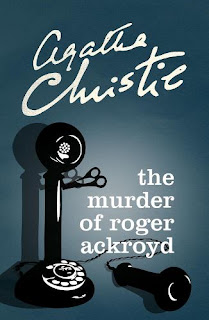An award winning masterpiece by the Queen of Crime
 |
| The latest HarperCollins reprint of The Murder of Roger Ackroyd |
Published in
1926, the book remains Agatha’s best known and most controversial novel because
of its ingenious final twist, which had a significant impact on the detective
fiction genre and has been imitated by many other writers since.
Agatha, who
died on 12 January, 1976 - 47 years ago today - has become famous for being the supreme
exponent of the old-fashioned English crime novel. Her skill in constructing
complex and puzzling plots and her ability to deceive readers until the very
last page, or paragraph, are unequalled.
But this
third Poirot novel, narrated by the local physician, Doctor Sheppard, in the
absence of Captain Hastings, who has gone to start a new life in the Argentine,
is considered by many readers and critics to be her masterpiece.
Wealthy
businessman turned country squire Roger Ackroyd lives in a charming English
country village, where dark secrets and dangerous emotions lurk beneath the
apparently calm surface.
When Ackroyd
is murdered, stabbed in the neck while sitting in his study after a dinner
party at his home, there are, as usual, plenty of suspects.
Poirot, who
has just come to live in the village, after retiring to grow marrows,
lives next door to Dr Sheppard. He is asked by a member of Ackroyd’s family to
investigate the murder because they are worried the police will get it wrong. Suspicion
has fallen on Ackroyd’s stepson, Ralph, who is a popular young man locally.
 |
| Agatha Christie died 47 years ago today at the age of 85 |
According to
The Home of Agatha Christie, the author’s own website, The Murder of Roger
Ackroyd was ‘the book that changed Agatha Christie’s career’. It was the first
of her novels to be published by William Collins, which later became part of
HarperCollins, who remain Agatha’s publishers today and attracted enormous
attention in the media at the time.
Following her death, Agatha Christie's body was buried four days later after a service at St
Mary’s Church in the village of Cholsey in Oxfordshire.
The
inscription on her tombstone is a quotation from Edmund Spencer’s The Faerie
Queen:
‘Sleepe after toyle, port after stormie seas,
Ease after
war, death after life, does greatly please.’
No comments:
Post a Comment